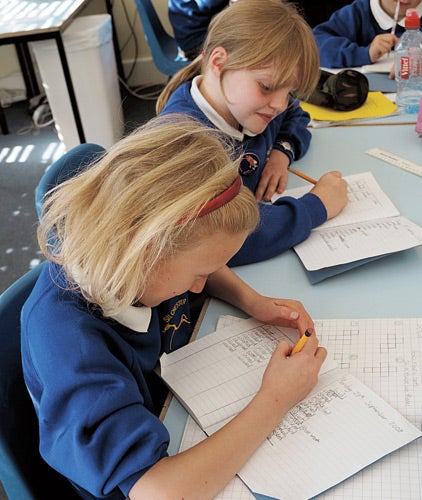School to start at four with new timetable to 'restore creativity'
Controversy as basics are downgraded to boost drama, computers and talking

Plans for the biggest shake-up of primary school teaching since the birth of the national curriculum were unveiled yesterday.
A government inquiry, carried out by former Ofsted inspector Sir Jim Rose, aims to restore creativity to the centre of the school curriculum for the schools of the 21st century.
As a result, lessons will focus more on the use of drama, for example learning history through role-playing characters from the past.
In addition, 10 and 11-year-olds will be encouraged to take part in essay-style extended projects which will give their secondary school teachers more of an insight into their thinking skills.
Children will be given their own personal tutors in the final years of primary school (staff from secondary schools) in a bid to smooth the transition between the two. Many youngsters slip back in performance during their first year at secondary school.
"Participating in a range of art forms helps children become creative, responsive, critical and appreciative," says a blueprint for the new curriculum drawn up for the review.
However, one of the biggest changes will be to guarantee every four-year-old a place in school in the September term after their fourth birthday.
Sir Jim recommends that all children should start primary school in the September after their fourth birthday – rather than waiting a term or two until they are five or nearly five.
Research shows that summer-born children who delay their entry are likely to fare worse in all forms of tests and exams right up until A-level. However, in an acknowledgement of critics who claim four is too young an age to start formal schooling (one in three teachers in a survey by the Association of Teachers and Lecturers believe it is wrong), he concedes that some youngsters could start school part-time. "Summer-born children risk being treated as 'immature' in comparison with their older classmates," the report acknowledges.
In addition, Schools Secretary Ed Balls, who gave ministerial backing to all the report's recommendations, announced the Government would fund full-time nursery education places for these four-year-olds if their parents preferred them to be taught in a more play-related setting. Asked if four was too young to start schooling, he said: "A lot of people would say that but I wouldn't."
Other key recommendations in the report include putting information technology on an equal footing with maths and English as the core elements of the curriculum. Some observers suggested this meant downgrading science, which is tested alongside maths and English at 11, but Sir Jim denied this.
Sir Jim also backs the introduction of compulsory languages teaching in primary schools, saying youngsters should learn one or two languages from the age of seven, particularly those such as French or German which they will continue to study at secondary school. He also supports early-years goals, such as insisting five-year-olds should be able to write their names.
Critics claim these have made pre-school settings too formal a learning environment for toddlers. "No arguments have been voiced that these goals are inappropriately pitched for young children," the report states. Mr Balls has pledged to set up another review to look at the early-years curriculum.
Sir Jim was silent on the issues of testing of 11-year-olds, saying only: "The important thing is to get the curriculum in place first – then you can look at how you assess it."
Christine Blower, general secretary of the National Union of Teachers, argued: "It is the high-stakes requirements of testing that will continue to determine primary schools' priorities."
At a glance: From summer babies to healthy living
* All four-year-olds will be guaranteed a school place in the September term after their birthday.
* Government to fund full-time nursery places for children of parents who thinks four is too young to start formal schooling. They will get 25 hours provision – instead of twelve and a half at at present.
* Information technology will be given equal status to English and maths as an element of the core curriculum.
* Teachers will be given training to ensure their IT skills are at least the equivalent of their pupils.
* All children to learn one or two foreign languages from the age of seven.
* Lessons in how to promote pupils' wellbeing and ensure they adopt a healthy lifestyle will be introduced.
* All children will have to study a minimum of two periods of history – and should be taught the broad chronology of British and world history.
* More emphasis on speaking and listening skills as well as reading and writing to combat the fact that youngsters from disadvantaged homes hear more than a million fewer words (from adults) by the time they start school.
* Children should study their own home town, another part of the UP and an area outside the UP as part of their geography lessons.
* Early learning goals of children being able to write their own names and use their phonics knowledge to write simple words by age five should become "ambitions" not "targets".
Join our commenting forum
Join thought-provoking conversations, follow other Independent readers and see their replies
Comments